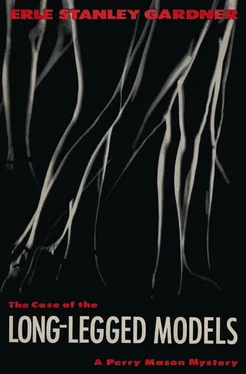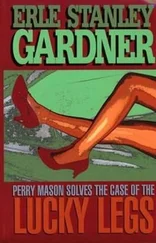“Yes, sir,” Garvin said. “I told her that I felt Casselman had killed her father, and that I was afraid he might try to kill her. I felt that she was in danger and I gave her this weapon so that she could protect herself. I told her to keep it in her possession at all times because I felt that I was in a position to develop a case against Casselman which would enable the authorities to arrest Casselman for the murder of her father and to prosecute him.”
Mason said, “Thank you. That is all.”
“No questions,” Hamilton Burger snapped.
“Now, if the Court please,” Mason said, “I move to strike out the entire testimony of the witness Garvin.”
“On what grounds?” Judge Decker asked.
“On the grounds that there is no evidence whatsoever showing that the defendant knew of the things Garvin was doing or had any inkling of what he intended to do. She is not bound in any way by anything he might have done in the mistaken belief that he was aiding her.
“Let us suppose that for some reason this witness had decided in his own mind that I had killed George Casselman. In order to protect me, he went to the Casselman apartment. He found that Casselman had been murdered but there was no evidence to indicate that I had committed the murder. I had not communicated with him in any way. I had not asked him to do anything. He tried to protect me by removing certain evidence. I certainly am not bound by the fact that he removed that evidence.”
Hamilton Burger still on his feet said, “Just a moment, Your Honor. Just a moment! I want to be heard on this. There are certain peculiar conditions existing in that Casselman apartment. The doorknobs were wiped clean of fingerprints. The footprint of a woman’s shoe, which the evidence now shows to be the defendant’s shoe, was obliterated by this witness. We have a right to show the physical conditions in that apartment and how they occurred.”
“You have a right to show the physical conditions,” Judge Decker said. “You have the right to show that someone wiped the latent fingerprints from the doorknob. But that doesn’t mean that you have a right to show that this was done by some friend of the defendant unless you can show that the defendant had some knowledge of the action and acquiesced therein, or suggested the action in some way.”
“Exactly, Your Honor,” Mason said, and sat down.
Judge Decker frowned. “This entire matter is highly unusual. It has been presented in a most unusual manner, and the Court is willing to confess that when the stock objections as to testimony being incompetent, irrelevant, and immaterial were made almost as a matter of routine, the Court didn’t realize exactly what was in the mind of counsel. The Court feels that counsel should have elaborated upon this point at that time.”
“If I had done so,” Mason said, “and the Court had sustained the objection, the prosecution would have achieved a notable triumph in that the inference would have been plain to the jurors who would have felt that evidence was being withheld on a technicality.”
“Well, there is certainly a part of this witness’s evidence that is pertinent,” Judge Decker said. “He gave the defendant the gun. He testified that, when he gave the defendant the gun, it was fully loaded. He has testified that later on that same evening he saw the gun for the second time, and that at that time it had one empty cartridge in the cylinder.”
“We will not include that evidence in our motion to strike,” Mason said. “Nor do we include evidence as to the shoe being that of the defendant. But we do object to all questions asked the witness as to his entering the apartment of George Casselman and we move that that portion of the evidence be stricken.”
“The Court is inclined to go along with you on that point, Mr. Mason. However, it is now approaching the hour of the evening adjournment. The Court will take the matter under advisement until tomorrow morning. In the meantime, the Court will take a recess until ten o’clock tomorrow morning, during which the jurors are instructed not to form or express any opinion as to the merits of the case, not to discuss the evidence, or permit anyone to discuss it in their presence. The jurors will refrain from reaching any opinion until the case has been finally submitted. Court will take a recess until ten o’clock.”
Hamilton Burger saved his surprise witness for the morning.
“Call Homer Garvin, Jr.,” he said as soon as Court had reconvened and it was stipulated the defendant was in Court and the jurors were all present.
Junior Garvin came forward, his lips a tight line of determination.
He was sworn, gave his name and address, and established his relationship as the son of the witness, Homer Garvin, who had previously testified.
“Now,” Hamilton Burger said, holding an extended finger in front of the witness, “I am going to ask you to listen very carefully to my questions and to answer those questions, and not to volunteer any information. It has been established that your father purchased three guns, identical in appearance, caliber and make. For convenience in the testimony we have designated the gun which he gave you as the ‘Junior Gun,’ the one which he had in his holster early in the evening of October Seventh of this year as the ‘Holster Gun,’ and the one which he had in his locked safe as the ‘Safe Gun.’ Do you understand these designations?”
“Yes, sir.”
“It now appears without contradiction that during the evening of October Seventh your father gave the defendant Stephanie Falkner the gun we have described as the Holster Gun, that he later on went to the safe and put the gun we have referred to as the Safe Gun in his holster.
“It also appears that one of these three guns was the murder weapon and it is now in Court as Exhibit Number 30. You understand these facts?”
“Yes, sir.”
“Very well. I now want to ask you about the weapon your father gave you which we will refer to as the Junior Gun. I am going to ask you whether on the 8th day of October of this year you gave Mr. Perry Mason this gun?”
“I did.”
“Did Mr. Mason have it in his hands?”
“He did. Yes, sir.”
“Did Mr. Mason do anything with that gun?”
“Yes.”
“What?”
“Objected to as incompetent, irrelevant, and immaterial,” Mason said.
“I propose to connect it up,” Hamilton Burger said.
“I think we should have something more than the District Attorney’s statement that he proposes to connect it up,” Mason said. “I would like to ask the witness a question simply on that phase of the case.”
“Very well,” Judge Decker said.
“Was that gun,” Mason asked, “the one we are referring to as the Junior Gun, the same gun which I now show you and which has been introduced in evidence as People’s Exhibit Number 30?”
The witness looked at the gun, said, “Definitely not. It was a gun exactly like this, in appearance, but it wasn’t this gun.”
“In that case, if the Court please,” Mason said, “anything that the witness might have done with any other gun is certainly not binding on this defendant, and is entirely outside the issues of this case.”
“I think that is correct,” Judge Decker said. “The objection is sustained.”
Hamilton Burger said angrily, “Well, I’ll get at it in another way. You see this gun People’s Exhibit Number 30?”
“Yes, sir.”
“Have you ever seen that gun before?”
“Yes, sir.”
“When?”
“Perry Mason handed it to me.”
“When?”
“On the eighth day of October of this year.”
“And what did you do with that gun?”
Читать дальше












